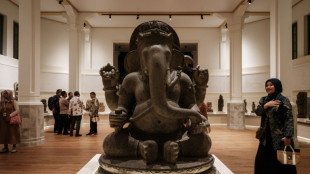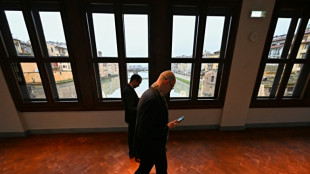
-
 Ski great Vonn finishes 14th on World Cup return
Ski great Vonn finishes 14th on World Cup return
-
Scholz visits site of deadly Christmas market attack

-
 Heavyweight foes Usyk, Fury set for titanic rematch
Heavyweight foes Usyk, Fury set for titanic rematch
-
Drone attack hits Russian city 1,000km from Ukraine frontier

-
 Former England winger Eastham dies aged 88
Former England winger Eastham dies aged 88
-
Pakistan Taliban claim raid killing 16 soldiers

-
 Pakistan military courts convict 25 of pro-Khan unrest
Pakistan military courts convict 25 of pro-Khan unrest
-
US Congress passes bill to avert shutdown

-
 Sierra Leone student tackles toxic air pollution
Sierra Leone student tackles toxic air pollution
-
German leader to visit site of deadly Christmas market attack

-
 16 injured after Israel hit by Yemen-launched 'projectile'
16 injured after Israel hit by Yemen-launched 'projectile'
-
Google counters bid by US to force sale of Chrome

-
 Russia says Kursk strike kills 5 after Moscow claims deadly Kyiv attack
Russia says Kursk strike kills 5 after Moscow claims deadly Kyiv attack
-
Cavaliers cruise past Bucks, Embiid shines in Sixers win

-
 US President Biden authorizes $571 million in military aid to Taiwan
US President Biden authorizes $571 million in military aid to Taiwan
-
Arahmaiani: the Indonesian artist with a thousand lives

-
 Indonesians embrace return of plundered treasure from the Dutch
Indonesians embrace return of plundered treasure from the Dutch
-
Qualcomm scores key win in licensing dispute with Arm

-
 Scientists observe 'negative time' in quantum experiments
Scientists observe 'negative time' in quantum experiments
-
US approves first drug treatment for sleep apnea

-
 US drops bounty for Syria's new leader after Damascus meeting
US drops bounty for Syria's new leader after Damascus meeting
-
Saudi man arrested after deadly car attack on German Christmas market

-
 'Torn from my side': horror of German Christmas market attack
'Torn from my side': horror of German Christmas market attack
-
Bayern Munich rout Leipzig on sombre night in Germany

-
 Tiger in family golf event but has 'long way' before PGA return
Tiger in family golf event but has 'long way' before PGA return
-
Pogba wants to 'turn page' after brother sentenced in extortion case

-
 Court rules against El Salvador in controversial abortion case
Court rules against El Salvador in controversial abortion case
-
French court hands down heavy sentences in teacher beheading trial

-
 Israel army says troops shot Syrian protester in leg
Israel army says troops shot Syrian protester in leg
-
Tien sets-up all-American NextGen semi-final duel

-
 Bulked-up Fury promises 'war' in Usyk rematch
Bulked-up Fury promises 'war' in Usyk rematch
-
Major reshuffle as Trudeau faces party pressure, Trump taunts

-
 Reggaeton star Daddy Yankee in court, says wife embezzled $100 mn
Reggaeton star Daddy Yankee in court, says wife embezzled $100 mn
-
Injured Eze out of Palace's clash with Arsenal

-
 Norway's Deila named coach of MLS Atlanta United
Norway's Deila named coach of MLS Atlanta United
-
Inter-American Court rules Colombia drilling violated native rights

-
 Amazon expects no disruptions as US strike goes into 2nd day
Amazon expects no disruptions as US strike goes into 2nd day
-
Man Utd 'more in control' under Amorim says Iraola

-
 Emery insists Guardiola 'still the best' despite Man City slump
Emery insists Guardiola 'still the best' despite Man City slump
-
US confirms billions in chips funds to Samsung, Texas Instruments

-
 English Rugby Football Union chairman quits amid pay row
English Rugby Football Union chairman quits amid pay row
-
Major reshuffle as Trudeau faces party pressure, Trump attacks

-
 Gatland remains as Wales boss but must 'change fortunes on the pitch'
Gatland remains as Wales boss but must 'change fortunes on the pitch'
-
Argentina's dollar craze cools under greenback-loving Milei

-
 Medici secret passageway in Florence reopens after refit
Medici secret passageway in Florence reopens after refit
-
Anger after Musk backs German far right

-
 Arteta says 'best is yet to come' as he marks five years at Arsenal
Arteta says 'best is yet to come' as he marks five years at Arsenal
-
Pereira happy to achieve Premier League 'target' with Wolves

-
 'Dark lull' in German energy transition sparks political debate
'Dark lull' in German energy transition sparks political debate
-
Russian skaters allowed to compete as neutrals in 2026 Winter Olympics


Japan's prices are finally rising, but will it last?
From rice balls to nappies, prices are rising in Japan. But unlike inflation seen in many other places, the increases are long-sought but also unlikely to last, analysts say.
Since the 1990s, the country has swung between periods of sluggish inflation and deflation, where prices are falling -- both considered bad for growth.
The central bank has tried an array of policies including pushing interest rates to rock-bottom to encourage spending and reach a two-percent inflation target, seen as key to boosting prosperity in the world's third-largest economy.
It hasn't worked: in 2021, the price of goods, not including volatile fresh food, inched down by an average of 0.2 percent.
But pandemic recovery demand, as well as a surge in oil and other commodities linked to the Ukraine war, may finally be achieving what the Bank of Japan couldn't.
Major Japanese companies have started raising the price of goods in a previously unthinkable, and sometimes controversial, fashion.
The maker of beloved children's corn snack Umaibo was even forced to apologise for the "commotion" caused by rumours ahead of a price rise amounting to two US cents, the first increase since its 1979 debut.
Other hikes have also made headlines in a country where wages and prices have long been stagnant.
The increases have been tough to make, according to Shigeto Nagai of Oxford Economics.
The so-called lost decades that followed Japan's 1980s boom have "cemented a deflationary mindset" among consumers, he told AFP.
"People believe that wages and prices will not grow," and so companies fear losing ground to competitors if they price items higher, he explained.
On a narrow, bustling street in eastern Tokyo, shopkeepers said they felt squeezed by a pandemic downturn and higher costs for essentials such as cooking oil, flour and fuel.
But many prefer to absorb extra costs rather than pass them on.
"We have been in business for over 70 years... we are extremely close to our customers," said Satoshi Okubo, whose family shop sells sweets and chewy udon noodles.
"For now, I am swallowing the increased costs," he told AFP. "We will only decide to increase our prices when it becomes absolutely necessary."
- Shrinkflation -
Some companies have instead opted to reduce the size of products while leaving the price unchanged, a move dubbed "shrinkflation".
But this risks irritating customers like Masayuki Iwasa, 45, who since 2020 has documented shrinking goods and price increases on his website "Neage", which means "price hikes" in Japanese.
"Some companies clearly say what they are doing, and others don't. If they announce what they are doing, I think customers would understand," he told AFP.
Despite the challenges, prices have been climbing in Japan since the autumn, albeit at nowhere near the blistering pace seen in Europe or the United States, where inflation recently hit a 40-year high of 7.9 percent.
Core consumer prices, excluding fresh food, increased by 0.6 percent on-year in February, according to data released Friday, and some economists predict Japan could reach its two-percent inflation target in the coming months.
That level is "not sustainable" though, Nagai said, because it is driven by external factors and intensified by a weaker yen.
One key to achieving longer-lasting price rises is wage increases, which for decades companies have kept low in part to avoid hiking the cost of products for consumers.
Jobs once for life and laden with benefits have been swapped for cheaper part-time roles, often occupied by women, and even those with lifetime jobs have seen paltry pay rises.
Prime Minister Fumio Kishida has made wage increases a central plank of his economic policy, calling for companies to lift salaries by three percent in annual spring wage negotiations.
Recent years have produced only marginal increases as trade unions prioritise job protection, however, and this year's first negotiations have been disappointing for Kishida and the unions.
Nagai also warns that unexpected events such as the wave of the Omicron coronavirus variant could impact efforts to hike inflation.
"We have been hoping for 'revenge consumption' by consumers (after pandemic restrictions), but many households have really experienced a sharp deterioration in real disposable income," he said.
G.M.Castelo--PC
